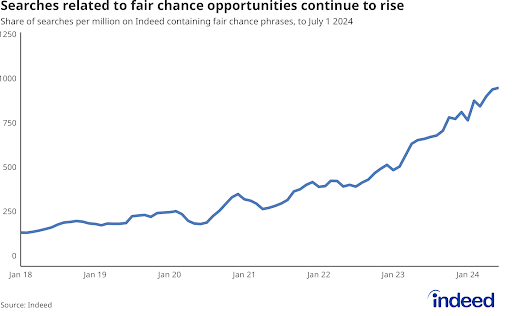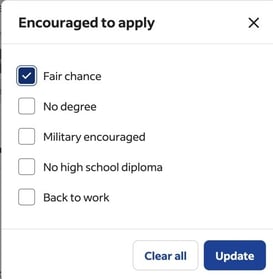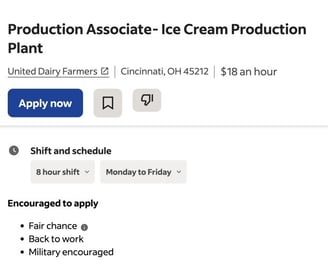Key Takeaways
-
-
- Over 77 million Americans have a criminal record, and last year, 1.3 million were searching for work.
- Fair chance hiring, often referred to as second chance hiring, offers job seekers with a criminal record a chance at securing employment.
- The benefits of fair chance hiring include larger talent pools, increased hiring rates, increased diversity, and increased retention rates.
- The percentage of job ads highlighting fair chance hiring varies by job, family, and industry.
- Employers can take simple actions to signal to job seekers that they are open to second-chance hiring.
-
What is Fair Chance Hiring?
Fair chance hiring, also called second-chance hiring, is a set of practices that ensures employers are open to hiring individuals regardless of their criminal record. Since hiring decisions are made based on an applicant's qualifications rather than a criminal record, fair chance hiring gives people with criminal records a greater employment opportunity. It ensures that employers assess skills before considering prior criminal records.
Although employers approach fair chance hiring in many different ways, there are federal and state-level laws that address fair chance hiring that should be considered.
How Do People Feel About It?
The federal law was passed in 2020, and according to the Justice Action Network, it was widely supported by Americans. The support was high across the board, with 72% of Republicans, 85% of Independents, and 91% of Democrats saying they support the act.
Indeed also commissioned a poll of one thousand Americans and found that 92% of workers said they would be comfortable working alongside a coworker with a non-violent record with a single isolated incident. Additionally, the survey found that 79% of workers surveyed believe that a diverse and inclusive company embraces fair chance hiring.
How Many People Could Benefit From Second Chance Practices?
There are 77 million Americans with a criminal record. (one in three people in the US). And The World Economic Forum reported in 2023 that this number is expected to grow to 100 million by 2030. Each year more than 600,000 inmates are released from state and federal correctional facilities and transition back into the community.
Finding employment is a barrier that these individuals face, and lack of a job is a factor that increases the likelihood of a person re-entering the criminal justice system. According to a recent report by the Council on Criminal Justice, securing sustainable employment after incarceration can cut recidivism by 61%. Offering employment opportunities to individuals with a criminal record provides a chance to turn their life around and contribute positively to the community. It can also help fill the gap of workers desperately needed in specific sectors.
From a job seeker perspective, 1.4M job seekers on the Indeed platform in 2023 searched for “fair chance” or “no background check” jobs. The most recent data on the topic, shown in the chart below, shows that the trend has continued to rise through the first part of 2024.

What Are The Benefits of Fair Chance Hiring?
There are many benefits of fair chance hiring. A few primary benefits are included below.
Larger, More Diverse, Talent Pools
Businesses that offer fair chance hiring practices can tap into the one in three Americans with a record.
Communities of color, LGBTQ individuals, and people with mental illness or abuse histories are disproportionately affected by criminal records. According to the National Library of Medicine, as an example, it’s estimated that people with felony convictions account for eight percent of all adults and 33% of the African American adult male population.
Increased Hires
According to Indeed, noting fair chance hiring practices in a job ad has been shown to increase the number of applications and hires.
Retention
Turnover is 13% lower than employees without records - saving companies approx. $1,000 per year per position.
An additional business benefit could include tax credits and increased profitability. According to Jeffery Krozenik, author of “Untapped Talent”, “This is business, not charity. Those that seize the opportunity to learn how to access this talent pool will have a decided competitive advantage over those that don’t.” When asked why fair chance is important for businesses, his response was, “Because it’s profitable to do so, period.”
What is the State of Fair Chance Postings So Far in 2024?
To gain an understanding of what is happening in general across the fair chance hiring landscape, the chart below from Public Insight shows the trendline. The data is derived from Indeed job postings that include “fair chance” encouraged to apply.
 Source: Public Insight
Source: Public Insight
Fair chance hiring rates vary widely by job type. The table below includes a few common job titles and the fair chance posting rate for each. Customer service associates and beauty consultants have higher rates of fair chance, while careers like engineers or nurses have much lower rates.

Source: Public Insight
What Industries Are Really Leaning In?
Some sectors are really leaning into fair chance hiring, such as manufacturing. The Manufacturing Institute has great resources available for companies who are considering implementing second chance hiring to expand their workforce. And according to the latest National Association of Manufacturers Quarterly Outlook, 31% of manufacturing companies have a program in place to address second chance hiring practices.
Programs manufacturers are implementing to address workforce challenges

How Can a Company Signal to a Job Seeker Openness to Fair Chance Hiring?
Ad Copy Optimization
General best practices employers can implement include updating job ad copy to signal to job seekers an openness to accept applications regardless of conviction history. Using phrases like “fair chance hiring,” “applicants with conviction records will not be excluded” or “people with a criminal record are encouraged to apply” are three common ways employers represent this info.
Indeed provides additional best practice verbiage that an employer could include: “We value diverse experiences, including those who have had prior contact with the criminal legal system. We are committed to providing individuals with criminal records, including formerly incarcerated individuals, a fair chance at employment.”
Update Formal Application
Several states now require companies to remove the disclosure box, as part of ban the box laws, to ensure candidates are not automatically disqualified if they select “yes” to the question asking about a prior conviction. Best practices could include removing this question, even if it’s not required within a specific state.


Job Board Signals
Indeed
Some job boards also have specific opportunities for employers to take it a step further. For example, on Indeed hosted jobs employers can select “fair chance” under encouraged to apply to provide a signal to job seekers. Below is an image of what it looks like from the job seeker's perspective when searching on Indeed.
LinkedIn
On LinkedIn candidates can filter from their job search screen to select companies that have pledged they are a fair chance employer. According to LinkedIn, If you’re an employer in the United States, you can sign the Second Chance Business Coalition pledge. LinkedIn updates its list of employers every month so that job seekers can filter and sort their job search results using this information.
From the job seeker's perspective, flipping the toggle on, as represented in the image below, will include relevant jobs. LinkedIn has also taken it one step further and offers a free LinkedIn learning course for job seekers with a criminal record.
.jpeg?width=525&height=265&name=FBDF1108-1C71-499B-B4FB-D26020ED75D4_4_5005_c%20(1).jpeg)
Jobcase
Additionally, Jobcase is a vendor that offers a community dedicated to fair chance, boasting over 20,000 job seekers who are a part of the network looking for jobs that offer fair chance opportunities.
Zip Recruiter
Zip Recruiter does not currently offer a way for an employer to show they are committed to fair chance. It also does not offer a way for job seekers to filter their search accordingly.
Which companies Are Doing a Great Job With Fair Chance Hiring?
Many companies have made concerted efforts to support fair chance hiring. Below are three that stand out.
Mod Pizza is a company that believes a person is not defined by their past, but by what they do in the future. The company does a great job telling the stories of their workers who were given the opportunity for a second chance.
JBM Packaging realizes that workers who are re-entering the workforce after a conviction may need extra resources, like coaches and peer mentoring. The company provides these resources, among others, to its employees. They are also open and transparent around their goals for fair chance hiring, which indicates to job seekers they are taking their pledge seriously
JPMorgan Chase considers workers with prior convictions “the waiting workforce.” In 2023, nine percent of JPMorgan Chase hires had a prior conviction. Jamie Dimon, CEO of JPMorgan Chase, said, “If you paid your debt to society, you should be allowed to work.”
In conclusion, fair chance hiring is a great way to increase a company’s talent pool, diversity, drive retention and hiring rates. It’s widely accepted by Amercians and can be good for companies and the country. Considering the best practice ideas above is an excellent first step to reaping the benefits of this hiring practice.
—-
Recruitics supports our clients with their hiring initiatives, including fair chance hiring. Our team of experts can provide insights into the competitive landscape for fair chance and can provide the support needed to ensure the marketing for fair chance hiring is activated across all channels.



